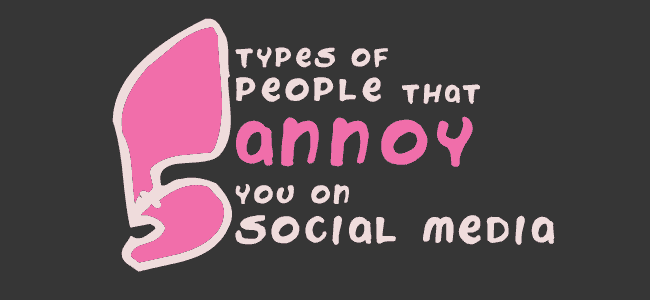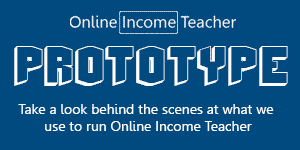For many of us, when we all signed up to social media sites when they first started, we didn’t really imagine how big they would become. Only now are we seeing the true impact that they have on both our social and professional lives. As well as the impression that we are giving to people online, more and more employers are taking into consideration your social media activities, which is why it is so important to present yourself well online, yet there are still plenty that are doing it wrong! In this post we will look at 5 types of social media people that get on everyone else’s nerves (especially employers) and why, if you are one of them, you could be harming yourself in the long run.
5 Types of Social Media People – Are You One Of These?
1. The Egocentric
Many people get so wrapped up in their own lives they believe that every detail of it will be of interest to their followers. In reality however, no one really cares.
What makes you think anyone wants to know about…
- When you woke up,
- What song came on the radio on your way to work,
- How long it took your computer to boot,
- What you think you’ll do for lunch,
- How busy you are,
- What your cat did,
- How many miles you ran/hours you worked out, etc.
A good trick to keep in mind when you’re composing your next tweet is to think to yourself,
“Will all (or any) of my followers find this information useful or entertaining, or should I just text my best friend.”
If you want to share something about your life, by all means share it. But if it’s better suited to a text message or conversation, do your best to keep it there.
You should also look at the frequency at which you post these. If your boss can see that you are tweeting, sharing, commenting, etc. on things like this throughout the whole day, then they may start to wonder what work you are actually doing!
2. The Incessant “Foodie”
Image by ‘Denis Dervisevic’ [Source]
Being a real foodie is awesome, especially if you are able to turn your love and appreciation for the art of food into an extra source of income. That said, many people feel the need to take to platforms like Instagram or Pinterest to post pictures of ‘EVERY’ single culinary creation, even if it’s macaroni and cheese again… just like every week.
Consider limiting your meal pictures to special occasions, and when you do, consider reading a few food photographing tips. That way when you do post a photo of your meal, the photo itself is just as artistic as the dish.
3. The One In Need Of A Journal
Social media is great at solving certain problems.
- Need a ride to work?
- Looking for a used piece of furniture?
- Need to find somewhere local to go out too? (etc.)
Asking your friends via social media is a great way to get information, but confusing your social media accounts for a journal is a huge mistake. Since your social media may be the only impression people have of you (again, think future employers), it doesn’t look good for you to post mundane complaints and personal issues.
Take a look back at your social media profile(s) and see what impression you are giving people. Do you come across as someone who moans a lot, or someone who is outgoing and positive? That is the impression you are giving to everyone else.
Also, know the difference between appropriate and effective crowd sourcing, and the inability to make simple decisions without at least four people’s input. If you want to know a great place to eat on a Tuesday, that’s a great time to ask your social network friends. But when you want to know what colour shirt you should wear today, make that decision on your own.
4. The “I’m Here with Everyone”
Tagging comments and pictures lets people know when you have posted something that have something to do with them. Maybe they’re in the picture or you think they have a connection to the photo or would find it entertaining. Checking into places sometimes gets you loyalty points and free items. Both of these practices make perfect sense.
But when you are incessantly tagging and checking in, it not only becomes annoying to your followers but also compromises privacy and security by letting the world know where you are and who you’re with. Unless a specific purpose is being served, reconsider tagging and checking in, especially for people other than yourself.
5. The Pot Stirrer
Social networks leave a lot of room for misinterpretation and some people make the mistake of assuming the worst in people – either retaliating to peoples comments or perpetuating the problem.
Many times people find themselves in arguments or quarrels because of something that occurred over social media. If you see someone say/post something that can be interpreted differently, try to assume the best and not go in all guns blazing, saying something that you may later regret. If someone says/posts something controversial, don’t attack them because of their opinions; remember that they are entitled to them and many see social media as a place to make their voice heard.
Watch what you say online. Whilst you may just be trying to have a joke with your friends, someone else may find it very insulting. There are plenty of examples of when social media can go bad, so just remember that what you post can be seen by a lot more people.
Be More Careful On Social Media
Social media has become so prevalent that you are almost expected to know how to conduct yourself when using it. Even so, it is difficult for many who use social media, both personally and professionally, to discern between what’s beneficial to post and what’s not.
The best rule of thumb for anyone using social media is to consider whether or not your post is contributing something valuable to anyone. Sharing an article that you found interesting, a photo of your favourite spot (or for social media managers; a behind the scenes snapshot into the company), etc. are all good social media practices to do because they are offering something new and valuable to the audience.
Implicitly referencing a person, company or thing (aka “subtweeting”) is a BIG no-no, as well as sharing random thoughts or opinions with little argument or explanation because they are more appropriate to share elsewhere and serve little purpose to your audience. So next time you take to your favourite social media platform, consider what message you are sending out into the world, because today, your social media accounts are reviewed nearly as much as your resume is.
What type of things do people do that annoys you on social media? What is your opinion on the whole “employers check social media profiles” subject? Please let us know your views and opinions below!



CommentLuv vs Disqus – Why I Don’t Use CommentLuv!